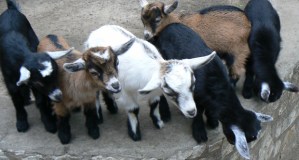Review: Goats (Royal Court)
The Royal Court stages Liwaa Yazji’s play about the war in Syria with live goats on stage
Yes, there are real goats in Goats. And very lovely they are. But they serve a serious function too: in Syrian writer Liwaa Yazji‘s play about the conflict, a goat is given as compensation for each martyred son. These curious, innocent beasts trit-trotting round the stage form a cruel physical reminder of what has been lost, and the insane warped logic of war.
Uncomfortably, you find yourself more absorbed in the animals than the plight of families in wartime. This is partly the point of course: the goats are the government attempting to distract its citizens. This is smart – but maybe more in theory than practice.
Because while the goats are endlessly watchable, the play really is not. It’s slack, scrappy, slow and stilted. The goats start to feel like a welcome distraction; the audience can’t help but gurgle as they naughtily chew up props, but it still feels a bit wrong getting the giggles in the middle of a play about a government sacrificing young men.
Actually, Yazji’s text feels like it ought to prompt very black laughter – maybe its humour is lost a little in Katharine Halls‘ translation, but it’s certainly not brought out by Hamish Pirie‘s uncertain direction. Goats is almost absurdist, a satire of state propaganda: TV screens frequently revert to a test card stating 'Everything is fine' and TV presenters spout wild hyperbole.
It could be delivered with a manically surreal zeal, but the pace is terribly slow. This exposes some strained and stilted writing and acting; there are gaps between utterances you could shepherd a herd of goats through. Amir El-Masry delivers some truly vicious sarcasm as a returning soldier, but elsewhere performances tend towards dour.
The plot contains a central mystery that’s devastatingly effective: why are young men calling their families and asking them what to do to terrorists they’ve caught? And why do these men never come home wounded – always martyred? But the storytelling is diffuse, and further muddied with under-explored, unclearly staged off-shoots (there’s a baffling subplot about, I think, black market fridges, and another where teenagers do something nasty to a poor goat entirely without consequence).
Rosie Elnile’s set is a hotchpotch: both floors and coffins made of cheap-looking wood, a backdrop of bright magenta, while the cast stay sat on stage in plastic high chairs. Presumably, some of this is intended to evoke poverty, but the visual effect is jumbled. TV screens live-relay broadcasts, effective in a show about the way narratives are twisted by authority, although I wondered if it was plausible that one small hillside village would attract quite so much media attention.
There are interesting directorial decisions in Goats but they often just don’t quite come through clearly enough. A group of chatting teenagers, for instance, speak into microphones, their names flashing up on the TV screens. Is this a comment on the way they’re being shaped by a society built on propaganda and surveillance, that every statement is effectively public? That’s interesting, but I’m rationalising after the fact; while actually watching, it simply added to the confusion of an already cluttered production.
Goats runs at the Royal Court until 30 December.
















